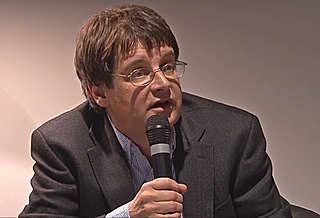A Quote by Kenneth E. Boulding
In calling society an ecological system we are not merely using an analogy; society is an example of the general concept of an "ecosystem" that is, an ecological system of which biological systems - forests, fields, swamps - are other examples.
Related Quotes
In the last few decades we have seen the extraordinary rise of ecosocialist movements around the world inspired in large part by Marx's ecological critique of political economy. Marx was indeed influenced by some of the earliest attempts to develop what we now call an ecological-systems view, rooted in the concept of metabolism. Building on this perspective, Marx defined socialism as the rational regulation by the associated producers of the metabolism between society and nature in such a way as to conserve energy and to promote the satisfaction of human needs.
Women must see that there can be no liberation for them and no solution to the ecological crisis within a society whose fundamental model of relationships continues to be one of domination. They must unite the demands of the women's movement with those of the ecological movement to envision a radical reshaping of the basic socioeconomic relations and the underlying values of this [modern industrial] society.
If you look into the way that materials are used in an ecological system you'll notice that you'll find that there is no waste. The waste of one organism becomes food for another and everything's recycled in an ecological system whereas in our human built environment there's a throughput system. We use something then we throw it away... We have to imitate nature and try to re-use everything we make as human beings or recycle them - when we cannot re-use or recycle them we should try to reintegrate them back into the natural environment.
There is the problem of unpaid labor, such as housework, which represents millions and millions of unsalaried work hours and on which masculine society is firmly based. To put an end to this would be to send the present-day capitalist system flying in a single blow. Only we can't do it by ourselves; there have to be other kinds of attacks on the system. So a certain alliance with revolutionary systems is necessary, even masculine ones.
Capitalism’s grow-or-die imperative stands radically at odds with ecology’s imperative of interdependence and limit. The two imperatives can no longer coexist with each other; nor can any society founded on the myth that they can be reconciled hope to survive. Either we will establish an ecological society or society will go under for everyone, irrespective of his or her status.
The reductionist measure of yield is to agriculture systems, what GDP is to economic systems. It is time to move from measuring yield of commodities, to health and well-being of ecosystems and communities. Industrial agriculture has its roots in war. Ecological agriculture allows us to make peace with the earth, soil and the society.
The ecological crisis we face is so obvious that it becomes easy...to join the dots and see that everything is interconnected. This is the ecological thought. And the more we consider it, the more our world opens up." The ecological thought "...is a vast, sprawling mesh of interconnection without a definite center or edge. It is radical intimacy, coexistence with other beings, sentient and otherwise.
To speak of ‘limits to growth’ under a capitalistic market economy is as meaningless as to speak of limits of warfare under a warrior society. The moral pieties, that are voiced today by many well-meaning environmentalists, are as naive as the moral pieties of multinationals are manipulative. Capitalism can no more be ‘persuaded’ to limit growth than a human being can be ‘persuaded’ to stop breathing. Attempts to ‘green’ capitalism, to make it ‘ecological’, are doomed by the very nature of the system as a system of endless growth.
In an ecological perspective, in other words, there are few accidents or anomalies, only outcomes based on system structure and dynamics. Climate change and glittering malls, Calcuttan poverty and sybaritic wealth, biotic impoverishment and economic growth, militarism and terrorism, global domination and utter vulnerability are not different things but manifestations of a single system.




































